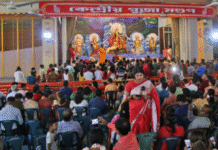Democracy is here, or not?
 During her recent Germany tour, prime minister Sheikh Hasina said she would not be in power after the current tenure. There was a little reaction but hardly any uproar among the political quarters after this. Several Awami League leaders, however, said there was no alternative to Sheikh Hasina.
During her recent Germany tour, prime minister Sheikh Hasina said she would not be in power after the current tenure. There was a little reaction but hardly any uproar among the political quarters after this. Several Awami League leaders, however, said there was no alternative to Sheikh Hasina.
If Sheikh Hasina has taken such a decision, she must have been thinking of an ‘exit plan’, too. There is ample time as well. If things run smoothly, the matter would be clear before the 2023 parliamentary elections. She can also change her decision. It happened in the past. When the BNP (Bangladesh Nationalist Party) formed a government with the backing of Jamaat-e-Islami in the 1991 elections, proving all assumptions wrong, she resigned from the presidency of AL taking all the liabilities. Later, she revoked the resignation letter following demand of many, especially root level, party activists.
Change of party leadership following defeat in the elections is common in the western countries. The political parties are not dependant on one person. The picture is different for the parties in this region. A party runs on the charisma of a person or a family here.
Before the last Awami League council, Obaidul Quader said the leadership would come from the Mujib family. BNP leader Nazmul Huda too, before his latest somersault, said leadership of BNP must come from the Zia family. After the crisis of the ‘one eleven’ when the BNP was in crisis with Khaleda Zia in jail along with Tarique Zia being arrested, her lawyer Rafiqul Haque said, ‘Bouma’ must be brought into politics. This ‘Bouma’ is Tarique’s wife Zubaida Rahman. Zafrullah Chowdhury too advised Zubaida Rahman should be made member of the standing committee. I am not sure whether this is still being discussed or not.
This cannot be denied that no alternative for Sheikh Hasina has been formed in the Awami League. The question simultaneously arises whether there is any alternative for Awami League to run the government too. The Awami League and BNP have been running the government by turns since 1991. Elections were held under an interim or caretaker government before being interrupted in 2014.
The Awami League is in power since 2009. According to the current stream of politics, this will continue. There is no political party to challenge or defeat the Awami League now.
Many consider that the BNP is a popular party. It was the sole alternative for the Awami League for long and it still is. The problem is everything cannot be won by the enthusiasm of wish fulfillment. There is a saying, “If wishes were horses, all beggars would ride”. Uncomfortable, but this is the reality. It is unlikely that the BNP could turn back. No matter what rage or contention people have against the Awami rule, they won’t take the BNP in power by holding an uprising on their own. I do not see any possibility of another ’69 or ’90 soon.
The opposition parties claim the Awami League has won the election forcefully by occupying the administration. The lesser known parties are even talking on the same note. Those having a minimum understanding of Marxism do know that “the state is a power enforcing organisation and it is under the occupation of the bourgeoisies”.
In that consideration the rivalry between Awami League and BNP must be seen as a bourgeois conflict. What is the leftists’ gain here if they cannot become the determining factor? There is no possibility in the proximity too. The leftist parties discard the other leftist ones. There are numerous parties and factions and everyone considers they are the perfect ones while the rest are headstrong, privileged. In this situation, the wind must propel the boat’s sail and naturally it would run fast.
About a year ago in an article I had said the country was entering into the ‘Mahathir era’. The tendency is, staying in power for a long time and the accessory is ‘development’. If a party or a quarter runs the government for a long time, development is inevitable. We have seen such developments three times here. The first was Ayub Khan’s ‘development decade’ during 1960s. The second wave occurred during the regime of Hussain Muhammad Ershad in the 1980s. We are in the third wave now. This one does not seem to finish soon. Because, who is there to challenge?
The question is what is BNP’s future? AK Fazlul Huq’s Krishak Praja Party (later named as Krishak Sramik Party) had much influence once. It was finished during his lifetime. The signboard remained till 1970. The National Awami Party (NAP) was the chief opponent of the Awami League once. There is no existence of NAP now after being divided into numerous sections. There is no existence of the Muslim League either that once led in the formation of Pakistan. In the 1970s, JaSaD (Jatiya Samajtantrik Dal) was a very strong political party. It was divided into six sections and now is facing existential crisis. Such examples make one afraid. Will that happen to BNP as well?
A country cannot be changed with zealous leaflet or graffiti. One may think the whole country is occupied by the socialists seeing such writings on the walls on certain campuses.
The grammar of politics is changing in the country. The old equation is no longer valid. There are hardly any academic discussions and analyses over this. Though, talk shows replete with quotations are often there in the television. A lamentation is heard often — there is no ‘democracy’ in the country. The question is when was democracy here? The rulers always say they have given democracy. The ones sitting on the other side of the table think there is no democracy. I think this is an endless debate.
*Mohiuddin Ahmad is a writer and researcher. He can be reached at mohi2005@gmail.com. This article, originally appeared in Prothom Alo print edition, has been rewritten in English by Nusrat Nowrin.









